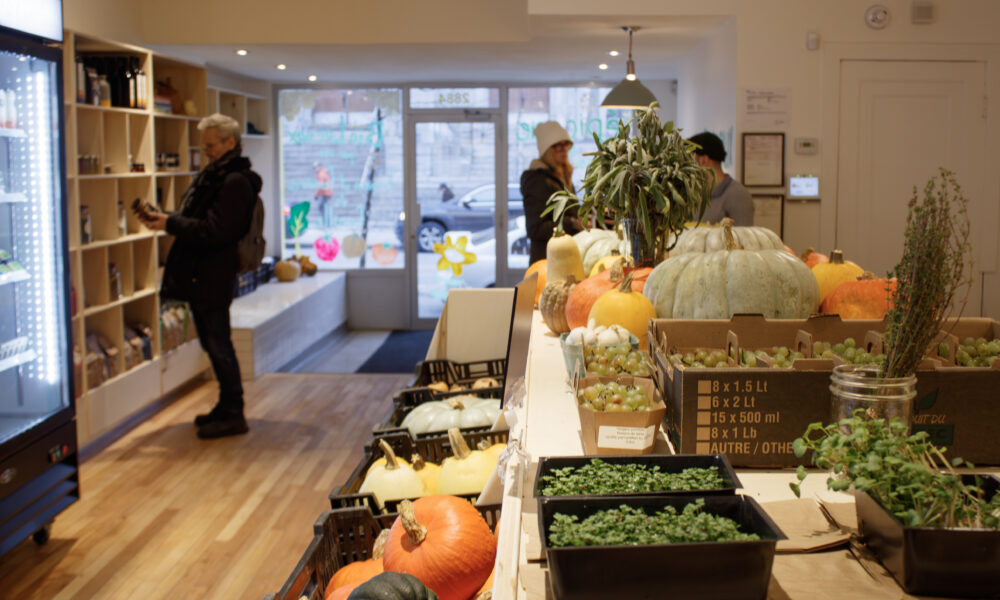Montreal, like so many other cities, has seen a steady rise in inflation of grocery prices. The grocery inflation rate is sitting at about eight per cent, and is expected to increase further throughout 2023. Canadians find themselves on tighter budgets, unable to buy the amount and quality of food that they once could, especially when it comes to fresh produce.
Bio Locaux––a recently-opened local-only grocery store between Montreal’s Rosemont–La Petite-Patrie and Plateau-Mont-Royal neighbourhoods––is combating these intensifying economic constraints by removing the “middleman” of production, that is the processes and costs associated with getting produce from the farm to the store. All of their produce is from local farms, meaning that the cost of transportation and packaging is less of a factor, allowing produce to be fairly priced and much more accessible.
Inflation in the Canadian grocery economy is upheld and exacerbated on all sides: The Canadian wildfires and climate-change-related devastation are damaging the land and the supply chain, making certain products more scarce, and therefore more expensive. The war in Ukraine has significantly impacted gas prices, increasing transportation costs. And, finally, the economy of grocery stores is becoming more concentrated during the pandemic, with about 80 per cent of the market controlled by just four companies: Loblaws, Sobeys, Metro, and Safeway. The grocery economy of Canada is effectively trapped in an economic oligopoly, where prices rise in response to climate factors, transportation, controlled by the overwhelming individual market power of a few corporations.
In Canada’s increasingly-concentrated grocery economy, Bio Locaux’s market model is an optimistic triple threat. Beyond its fundamentally fair prices and nutritious produce, its support of local farmers inherently sustains the environment. Oil and gas extraction makes up the largest percentage of carbon emissions in Canada. Supporting local farmers mitigates gas consumption as major transportation is no longer a factor of production. Such systemic decrease in gas usage massively progresses the world toward decreased carbon emissions and is vital in creating a sustainable future.
On an individual level, high grocery prices have led many Canadians to sacrifice nutritious foods such as dairy, meat, and produce for cheaper, less nutrient-dense foods. Bio Locaux sells the very products that have become too expensive for many Canadians, providing a critical supply of healthy food in an economy where such products are becoming too difficult to buy.
Unless the powerful grocery firms of Canada make a similar attempt to get rid of the middleman of production, they will continue to out-price their customers, forcing them to turn elsewhere for affordable options. While a single store like Bio Locaux is far too small to supply even a fraction of the produce that the Canadian population requires, consumers should continue to support this local market structure as the solution to the crises that overpowering grocery firms spearhead.
Despite the impracticality of expecting local stores to replace firms such as Sobeys and Loblaws overnight, innovators and grassroots food activists will likely adapt the Bio Locaux model within Montreal and beyond. When local produce and decreased international food trade become a priority for the Canadian government, funding could be allocated toward larger greenhouses and growing facilities. Such reallocation would be especially successful in light of McGill’s food insecurity, where students are generally less inclined to buy healthy produce due to expenses. An accessible produce business such as Bio Locaux would likely receive a large number of student customers and benefit the health of the large student population.
Bio Locaux, while small and still developing in Montreal, presents a hopeful model for the future of Canadian food accessibility—for students and Montreal locals alike—in a time when the larger grocery economy is increasingly inhospitable. Such initiatives have already begun in places such as the University Centre, with its new independent grocery store Les Fermes du Marché. The future prospects of small-scale affordable produce look possible, and Bio Locaux is helping realize it.









